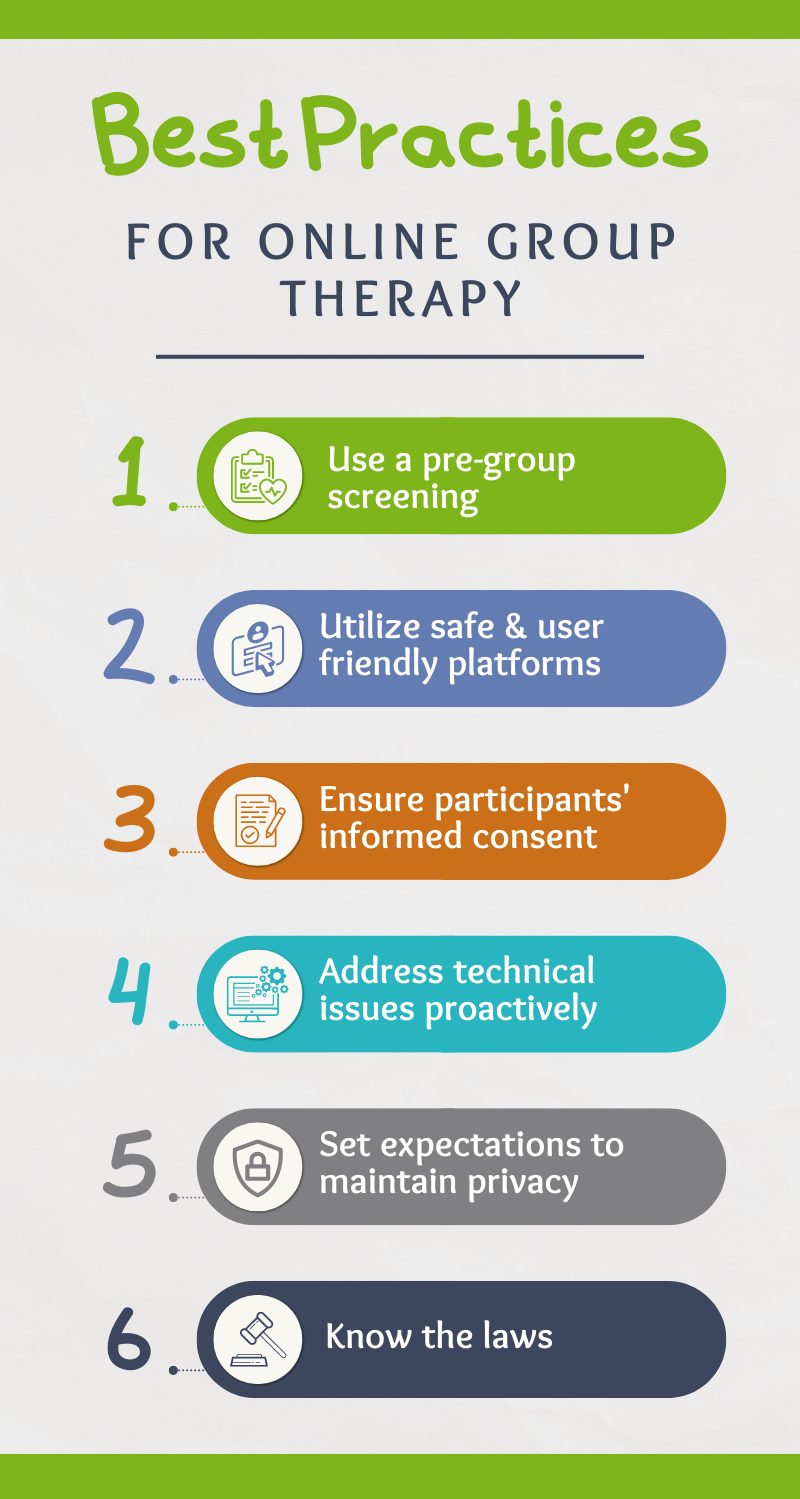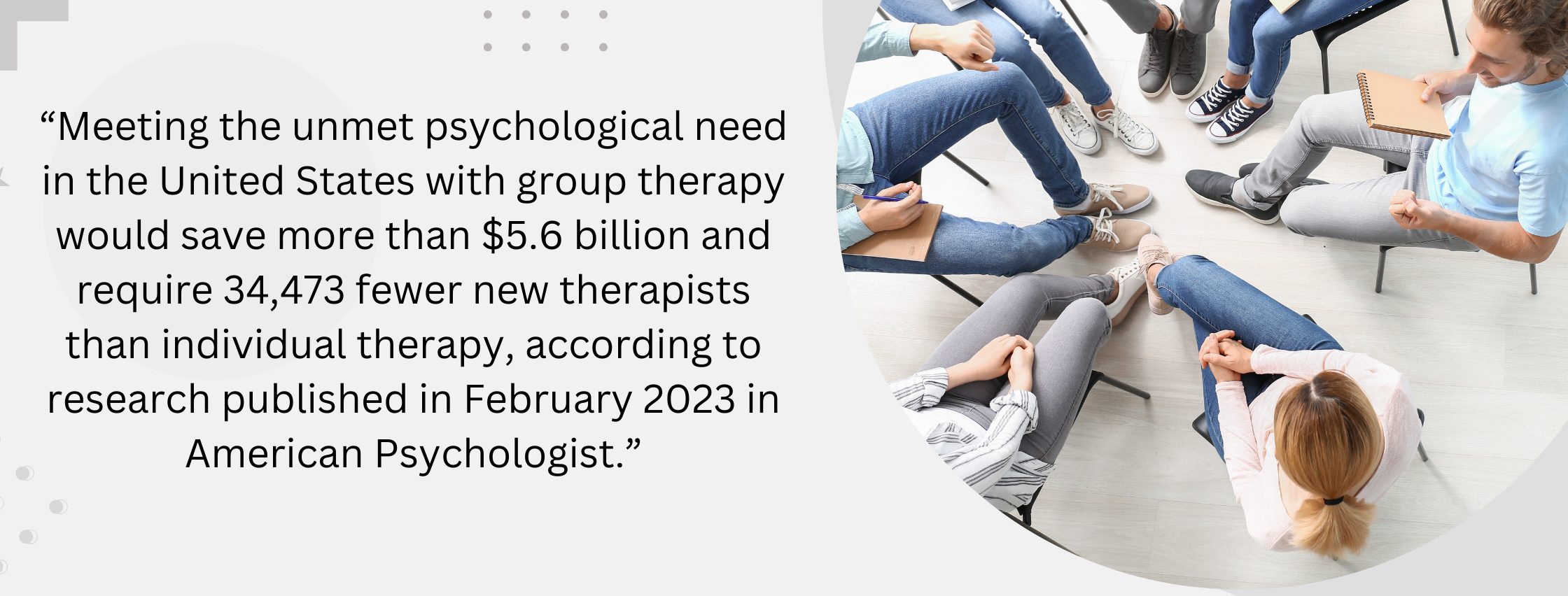
Online Group Therapy: Navigating Opportunities and Challenges for Effective Treatment
Online group therapy is a wonderful treatment modality for clients and the therapists treating them. By gathering clients with similar concerns in the same place at the same time, group therapy can be very rewarding. With an increase in virtual treatment over recent years, online group therapy is growing more popular, but it comes with a unique set of opportunities and challenges.
Free Download: Group Therapy Starter Kit
Download an exclusive copy of our Group Therapy Starter Kit packed with valuable articles on building and sustaining therapy groups, enhancing your skills, and working with special populations. You'll also gain access to 9 essential resources that every clinician needs to run successful therapy groups.

Opportunities of Online Group Therapy
Online group therapy involves bringing together a group of people virtually to address a shared mental health symptom or condition. Whether the group members are across town or across the country, the internet permits audio and video communication. Although it may not be the same as a group of people and their therapist sitting together in the same room, virtual group therapy offers a host of advantages over traditional group therapy.
Accessibility and convenience of group therapy online
For many clients, getting to therapy sessions presents a major barrier. Childcare, traffic, transportation issues, work, and other commitments can all keep people from attending a group therapy meeting. In many communities, professional treatment options may not even be available, but when sessions are available virtually, clients can reduce or eliminate all of these barriers.
This accessibility and convenience is a benefit to the therapist as well. Now, bad weather, tight schedules, and other commitments don’t have to stand in the way of running a successful group. Perhaps finding the appropriate physical space to facilitate a group has been a challenge previously, but with online sessions, group sessions can happen in a small office.
As long as the client has a strong internet connection, a connected device, and a low distraction space with appropriate privacy, online group therapy is accessible and likely much more convenient.
Increased anonymity and reduced stigma
Most traditional, in-person therapy sessions involve the client parking their car, walking into a therapy office, and sitting in a waiting room. For many people seeking therapy, these behaviors can trigger huge levels of shame, anxiety, and fear as they battle perceptions of social stigma against those with mental health conditions.
With online group therapy, these fears can be minimized through a greater sense of anonymity that comes with virtual communication. Lower levels of anxiety linked to online therapy groups can allow more people to seek help and receive the treatment they need.
Diverse group options
Online therapy groups allow clients to find a group that best fits their needs and goals, even if it’s not local. They don’t have to settle for a group that is “good enough.” Not only can clients benefit from online therapy groups, but therapists and group facilitators can as well.
By lowering the barrier to entry and increasing the treatment area, therapists can access more clients that better fit the group process. This increase can lead to more specialized and targeted groups that produce better results.
Best Practices for Conducting Online Group Therapy
Online group therapy options provide amazing opportunities for the client and the facilitators, but caution must be exercised. To establish effective, safe, and engaging online therapy groups, consider these best practices for group therapy online:
- Use a pre-group screening. Be sure to meet with clients, either in-person or virtually, before the group begins to assess their appropriateness. A few inappropriate members can disrupt the entire process.
- Utilize safe and user-friendly platforms. If the software interface is confusing, clunky, or inconsistent, clients will struggle with the group or avoid the process completely.
- Ensure participants' informed consent. Therapists should clearly spell out the unique risks and challenges linked to online group therapy.
- Address technical issues proactively. Devise a plan of action to follow if the internet connection is lost or someone is struggling with their service. Being preventative can reduce panic.
- Set expectations to maintain privacy and confidentiality. Find solutions with the group to establish guidelines and policies about trust, ethics, and boundaries. At the same time, therapists should set repercussions for violations.
- Know the laws. Where are the clients located? What types of services are they eligible for? Therapists should be certain their licensing board allows for these services and that any billed insurance will reimburse the services.

Challenges of Online Group Therapy
Like all treatments, online group therapy is not without its complications. Some issues of group therapy will be eliminated with online options, while others will seem amplified. Being aware of the challenges of online group therapy can allow the therapist and client to best shrink the risk.
Technology-related issues
Few things are more frustrating than a slow, laggy, or glitchy internet connection, and few things can disrupt the flow of a session like freezing and inconsistent audio. The capabilities of high speed internet connections are amazing, but not immune to difficulties.
Many people have access to connected devices and are savvy when using them, but there is still a percentage of the population with no access to needed hardware, limited familiarity with applications, or no ability to connect to the internet. For them, online group therapy is not a viable option.
Privacy and confidentiality concerns
Concerns over privacy and confidentiality are increased during online therapy groups for a few ways. First, the other group members could breach confidentiality by:
- Recording the session
- Taking pictures or screenshots of the meeting
- Attending the meeting in a location that lacks privacy
Second, the video platform may lack the appropriate compliance required by HIPAA. Not all online therapy software are HIPAA-compliant as Zooms, Meets, and Facetimes use different standards, so be sure to research the platforms that value safety and security. Be aware, though, even secure group therapy software may be at risk for hacking and data leaks.
Therapeutic limitations
Being a group therapy facilitator takes a lot of attention and the ability to spread focus across the room to observe body language and non-verbal cues. Only seeing someone from the shoulders up can definitely hinder this process.
Along the same lines, managing the attention and focus of clients online while building group cohesion is a test of the therapists’ skill. The group session must be more valuable and more engaging than the possible off-screen distractions.

Final Thoughts on Online Group Therapy
There is no reason to shy away from online group therapy. Virtual group therapy is fun and rewarding, and studies show that it carries the same efficacy as individual therapy, but it only accounts for about 5% of all therapy services. According to research published in American Psychologist in 2023, meeting the unmet psychological need in the United States with group therapy would save more than $5.6 billion and require 34,473 fewer new therapists than individual therapy,
Like all therapeutic options, online group therapy carries a set of challenges and opportunities. With some extra planning, awareness, and research, a skilled therapist can minimize the risk while accentuating the rewards.
One aspect of the group therapy process that may deter devoted therapists is the group note-writing process. Writing 10 progress notes for each session may seem overwhelming. If you've decided to move group therapy sessions online, ICANotes can help. The ICANotes EHR was designed for behavioral health professionals and offers time-saving features, such as customizable note-taking templates, a group therapy notes module, a patient portal, billing solutions and an integrated telehealth platform. With the telehealth feature, you can easily launch virtual group therapy sessions and take accurate notes at the same time. If you'd like to reduce documentation time and offer greater convenience for your clients, sign up for your free trial of ICANotes today.
Start Free Trial
About the Author

Eric Patterson, MSCP, NCC, LPC
Eric Patterson, MSCP, NCC, LPC, is a professional counselor who has been working for over a decade to help children, adolescents, and adults in western Pennsylvania reach their goals and improve their well-being.
Along the way, Eric worked as a collaborating investigator for the field trials of the DSM-5 and completed an agreement to provide mental health treatment to underserved communities with the National Health Service Corp.
Sources
Department of Health and Human Services. (2022). Telehealth for behavioral health care: Group teletherapy.
Whittingham, Martyn and Martin, Jennifer. (2020). How to do group therapy using telehealth. American Psychological Association.
Lattie, E.G., Stiles-Shields, C., and Graham, A.K. (2022). An overview of and recommendations for more accessible digital mental health services, Nature Reviews Psychology.
Pappas, Stephanie. (2023). Group therapy is as effective as individual therapy, and more efficient. Here’s how to do it successfully. American Psychological Association.
